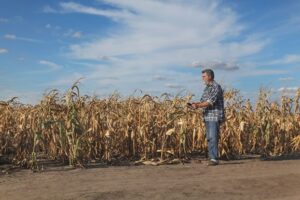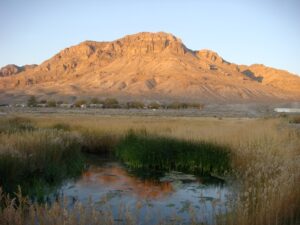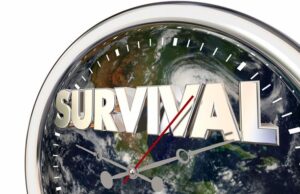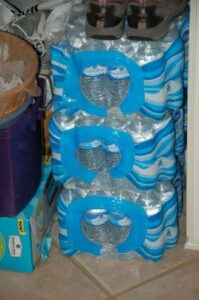Climate change is all over the news. Let’s take a look at what this might mean to become a climate change prepper and what climate change might mean for preppers and the prepping market as a whole. But first…
Is Climate Change Real?
Climate change is a political subject, and in today’s political climate, that means it’s a polarizing subject. Those on the right say it isn’t happening. Those on the left say the sky is falling. There isn’t much common ground.

I have seen the conversation change over time, however. Fewer people are outright denying that climate change is happening. People are transitioning from “it’s not real” to “it’s real, but it’s not man-made.” Alternatively, they are going from “it’s not real” to “it’s happened before, and there’s nothing we can do about it.”
But this post isn’t about whether climate change is real or not. I’m not going to cite the evidence that climate change is real, or that humans are the major cause of global warming. This post assumes that climate change is happening.
Impacts of Climate Change
According to the report, unless drastic measures are taken (on the scale of fighting a major world war), we can expect:
- a collapse in ecosystems including coral reef systems, the Amazon rainforest, and the arctic
- poorer nations that lack the infrastructure to cool their living environments (A/C) will become unlivable
- deadly heat conditions will persist in West Africa, tropical South America, the Middle East, and South-East Asia
- water availability will decrease sharply in the tropics and subtropics where agriculture becomes nonviable
- food production will drop across the globe – food prices skyrocket
- extreme weather events will happen more frequently, including heat waves, floods, and storms
Infrastructure, agriculture, fisheries, and ecosystems will be increasingly compromised. Wildfires will happen more frequently. Water supplies will decrease. There will be a great die off of many species, another mass extinction.
Other Implications
If you’re prepping to confront the effects of climate change, you have to be mindful of the other implications we might face…
- Climate migration. National Geographic states that up to 143 million people could become displaced by water scarcity and crop failure. What will the impact of migration on this scale be as more parts of the planet become unlivable?
- Capitalism at risk? Scientists have argued that climate change puts capitalism at risk. The theory is that we will have to confront climate change, and that will inevitably mean the end of the cheap energy that has fueled economic expansion. An economy built on consuming more and more will come to an end.
Climate Change will Draw More People to Prepping

I’ve been in the prepping business long enough to see the ebbs and flows of the market. I was on the early side of it, when “prepper” was still associated with the fringe “survivalist” folks – loners in the woods sitting on stockpiles of guns and ammo. Since then, “prepper” has become a household term with prepping becoming far more mainstream than it has ever been to the point freeze dried food can be purchased in everyday places like Costco. Reasonable people are preppers. In fact, once you look at the many reasons to prepare, “reason” follows that you must prep!
The same as 9/11, the government’s poor response to Katrina, and the Great Recession, global warming will draw another wave of people to prepping. It may be the biggest draw ever. This may be a different crowd than your typical recession prepper, civil unrest prepper, etc., but the climate change prepper will grow in numbers. You can see this already through events like climate change preparedness forums. These preppers will be younger, as today’s youth will face more of the consequences of global warming.
Prepping for Climate Change is Both Similar and Different
What will prepping for climate change look like? In many ways, not that much different from prepping for anything else. A big part of prepping is preparing for natural disasters. Natural disasters and climate change go hand-in-hand. According to NASA, some of the effects of climate change on the United States will be:
- Rising Temperatures – This will not be uniform across the country or over time.
- Frost-free Growing Seasons Will Lengthen – Food-wise, this could be seen as a good thing, but read on.
- More Droughts and Heat Waves – Just when you think the growing season will extend, heat waves and droughts will stress food security.
- Hurricanes Will Become Stronger and More Intense – Storm intensity and rainfall from hurricanes will increase will require greater preparation for hurricanes.
- Sea Levels Will Rise – Expect greater storm surges and higher tides. Don’t forget that warming oceans also impacts fishing.

As preppers, we should already be aware of the necessary basics for prepping. If you’re new to prepping, you can start by reading FEMA’s Are You Ready? book… but many preppers have pretty strong feelings about FEMA and their Katrina response. Still, the book covers the basics. If you’re following sites like SHTFblog, however, you’re already ahead of the game.
The basics, of course, include everything from having an emergency plan, having food and water stored, making a bug out bag, to the more mundane subjects of having financial protection for your house, apartment, etc. These are not new ideas for most preppers, but in what ways will climate change require new means of prepping?
Call me a pessimist, but I do not have much faith in humanity. I don’t think we will fully confront climate change before the full effects hit. But what, as preppers, should we do to prepare for it?
- Consider your age. If you’re 60 years old, carry on with other worries. Not to be morbid, but you won’t live long enough to face the full impact. If you’re 40 years old, you might want to start teaching the next generation about what they face. If you’re 20 years old, it’s time to start planning for yourself!
- Consider your location. Where do you live? If you live in Las Vegas (Las Vegas underground bunker tour), you face a worse water situation than what other areas of the country might confront. Do you live in a flood zone near tidal waters? Maybe you should move before property values plummet. The same applies if you’re in an area with worsening wildfires.
- Consider your food sources. Extreme weather will mean food price fluctuations. Farming production will be less consistent. Is your pantry stocked? Is it time to start a garden?
- Consider your energy sources. Energy will inevitably cost more. If you live in a cold environment, are there ways to preserve heat? If you live in a hot environment, are there ways to cut cooling costs?
- Be a prepper. Continue doing many of the things you already do. Becoming self-reliant buffers the impact of any external event. Having emergency supplies in place will help you and your family endure ever more natural disasters. The very act of being a prepper (join the Prepper Press tribe) already puts you well ahead of others.
Different Ways of Prepping for Climate Change
The same as prepping for a recession requires different methods than prepping for civil unrest, prepping for climate change will require different methods as well. While climate change will require preparing for more hurricanes in certain areas, there are longer-term issues that will need to be addressed. Here are a few:
- Environmental Migration – There are already indications that climate change is driving mass migration around the globe. While the United States may not face the type of migration problems that people in Bangladesh, Africa, Central America, and Australia might face, the people in these places will have to go somewhere when drought and famine strike. Their migration will cause political and economic challenges around the globe. How can you prepare for that as an individual? I don’t know.
- Food Shortages – Erratic weather will wreak havoc on agriculture. Farmers will experience drought, then abnormally heavy rainfall, then drought, then hail, etc. Food prices will swing up and down. The household impact will be felt at the grocery store checkout.
- Gardening – Preparing for this could, and should, include growing more food at home. That could mean anything from an herb garden off your deck to a full-size family survival garden. Gardening, and doing it well, requires knowledge and experience. You can’t just go and plant a garden expecting results. Good soil often takes years to produce. Knowing how to prevent pests and crop disease also takes experience. That’s not even covering seed saving.
- Preserving Food – If you’re growing your own food, you will eventually graduate to producing food that will take you through winter. That means not only growing more but preserving it. Buy a copy of the USDA Complete Guide to Home Canning and learn how to can. Maybe you will build a root cellar and/or dry storage.
- Stocking Up – Remember that what hits farms will also hit you, so your garden could be subject to the same erratic weather. Stocking up on non-perishables is a basic tenet of prepping. For climate change, you will want to do more of that. Take advantage of sales. Stock a pantry and rotate stock. When there are shortages and prices are high, you can use the stock you already have.
- Finances – Having your financial house in order makes sense on every level, and it also applies here. Energy may cost more. Homeowner’s insurance may cost more. Food may cost more. And, depending on where you live, you may also be face with…
- Moving – Some people are already experiencing the urge to flee (think people in California who are under a near-constant threat of wildfires). People living along the coast may also be finding an urge to move inland. More and more people will be wondering where to escape climate change in the United States. Real estate prices will decline in some places, rise in others. If you are not wedded to a particular area, or your kids/grandkids are wondering where to live, getting ahead of the population move may be wise.
Why Climate Change Preppers Should be Welcomed

Whether you believe climate change is happening or not, whether you think it’s man-made or not, climate change preppers should be welcomed into the prepping community. Even if they don’t align with the typical prepper’s political beliefs, the more people that are prepared the better – regardless of their reasons!
Think of this practically, even if you have distaste for those with dramatically different political beliefs. If your neighbor is prepared, and your neighbor’s neighbor, that means greater security for you WTSHTF. Every prepared person means one less hungry person looking for what you might have. How can that be a bad thing?
And remember! When the apocalypse hits, when disease is rampant, politics will all get tossed aside when people band together for mutual survival. That bleeding-heart liberal down the street might be covering second watch when the neighborhood defenses go up against the hordes of zombies.

7 comments
Congratulations. A very good article. One of the better ones on this topic I have read so far.
there’s hope for all of them…
(if they see the need to prep)
I think about 99.0% of Climate Change prepper’s will not be prepping, They will just take from You!
Good article with excellent information to ponder. I have to admit though, I am troubled when people loosely interchange Climate Change and Global Warming. If your article supports symptoms and outcomes of warming, then state it as such. To say that Climate Change will result in rising temperatures, frost free growing, rising sea levels is only a partial truth, it is the warming trend within Climate Change that would cause the above. What about the cooling trends within Climate Change, will they cause the above, nope. So why not be more precise and when discussing the effects of warming, be clear in stating as such and not just loosely interchanging the terms? If we are going to affect change then the more precise the details and references the better. The climate is always changing, ALWAYS and always has been. So to refer to our current challenges and wrap them with such a vague term does not do the weight of the subject matter justice. So for the preppers out there, just look back only a couple generations and see “prepping” is nothing new and should be done regardless of warming or cooling trends within the ever changing climate cycles.
Excellent start to the article but I was hoping for more details.
Can you actually address excessive heat drought and wildfires and water shortage and what one should stock up on if we live in states that will have that problem?
I can’t fight one single article that talks about that type of detail
That level of detail would be a big undertaking. There’s a mountain of information out there on water collection, storage, and conservation. Wildfires, as for protecting your home, I think California has a lot of good information on that, building codes, etc. I’m not sure if that helps or not.
I understand
Unfortunately I’m talking about a simple start of what to prep for and what materials to collect and stockpile would’ve been a nice little basic article about heat water etc.